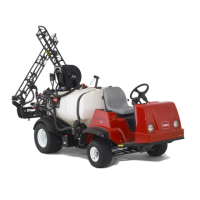Safety
Improper use or maintenance b y the operator or
o wner can result in injur y . T o reduce the potential
for injur y , comply with these safety instr uctions
and alw a ys pa y attention to the safety aler t
symbol, whic h means CA UTION , W ARNING , or
D ANGER—personal safety instr uction. F ailure to
comply with the instr uction ma y result in personal
injur y or death.
Super visors , operators , and ser vice persons should
be familiar with the follo wing standards and
publications: (T he material ma y be obtained from
the address sho wn).
• Flammable and Combustible Liquids Code:
ANSI/NFP A 30
• National Fire Protection Association:
ANSI/NFP A #505; P o w ered Industrial T r uc ks
National Fire Prev ention Association
Bar r ymarc h P ark
Quincy , Massac husetts 02269
U .S .A.
• SAE 2258 Light Utility V ehicles
Society of A utomoti v e Engineers
SAE W orld Headquar ters
400 Commonw ealth Dri v e
W ar rendale , P A 15096-0001
• ANSI/UL 558; Inter nal Combustion
Engine P o w ered Industrial T r uc ks
American National Standards Institute , Inc .
1430 Broadw a y New Y ork,
New Y ork 10018 U .S .A.
or
Underwriters Laboratories
333 Pfingsten R oad
Nor thbrook, Illinois 60062
U .S .A.
Safe Operating Practices
T he spray er is an of f-highw ay v ehicle
onl y and is not designed, equipped, or
man uf actur ed f or use on public str eets,
r oads, or highw ays.
Supervisor’s Responsibilities
• Mak e sure that operators are thoroughly
trained and familiar with the Operator’ s Manual ,
Engine Man ual, and all labels on the spra yer .
• Establish y our o wn special procedures and
w ork r ules for un usual operating conditions
(e .g . slopes too stee p for spra yer operation).
Chemical Safety
Chemicals ar e hazardous and can injur e
y ou, bystander s, animals, plants, soils, or
other pr oper ty .
• Car efull y r ead and f ollo w the chemical
man uf actur er’ s instr uctions f or the safe
pr eparation, use, and disposal of the
chemical.
• K eep chemicals of f of y our or bystander’ s
skin. If contact should occur , w ash it
of f immediatel y with clean w ater and
detergent.
• W ear go g g les and other pr otecti v e
equipment as instr ucted by the chemical
man uf actur er .
• Obtain proper training before using or
handling c hemicals .
• Use the cor rect c hemical for the job .
• F ollo w the c hemical man ufacturer’ s
instr uctions for the safe application of the
c hemical.
• Handle c hemicals in a w ell v entilated area.
• W ear g og gles and other protecti v e equipment
as instr ucted b y the c hemical man ufacturer .
Ensure that as little skin as possible is exposed
while using c hemicals .
• Ha v e clean w ater a v ailable especially when
filling the spra y tank.
• Do not eat, drink, or smok e while w orking
with c hemicals .
• Alw a ys w ash y our hands and other exposed
areas as soon as possible after finishing the
w ork.
4

